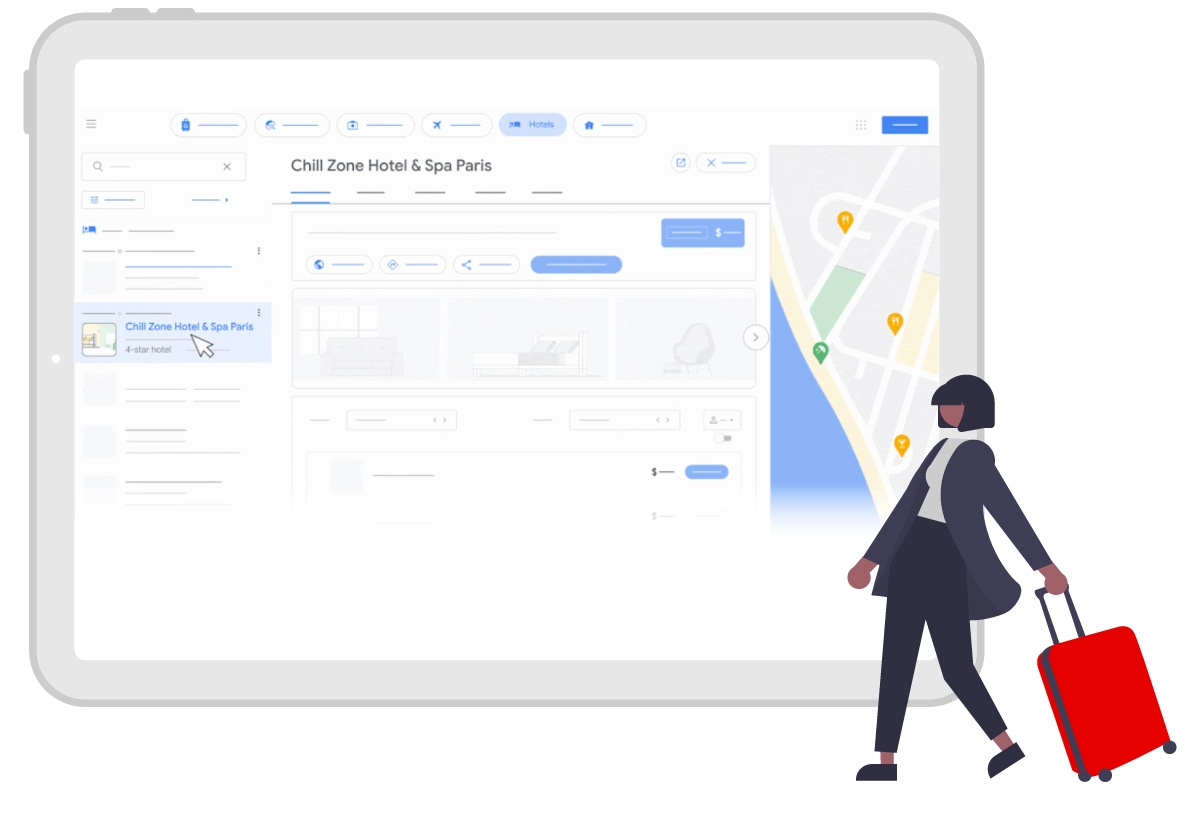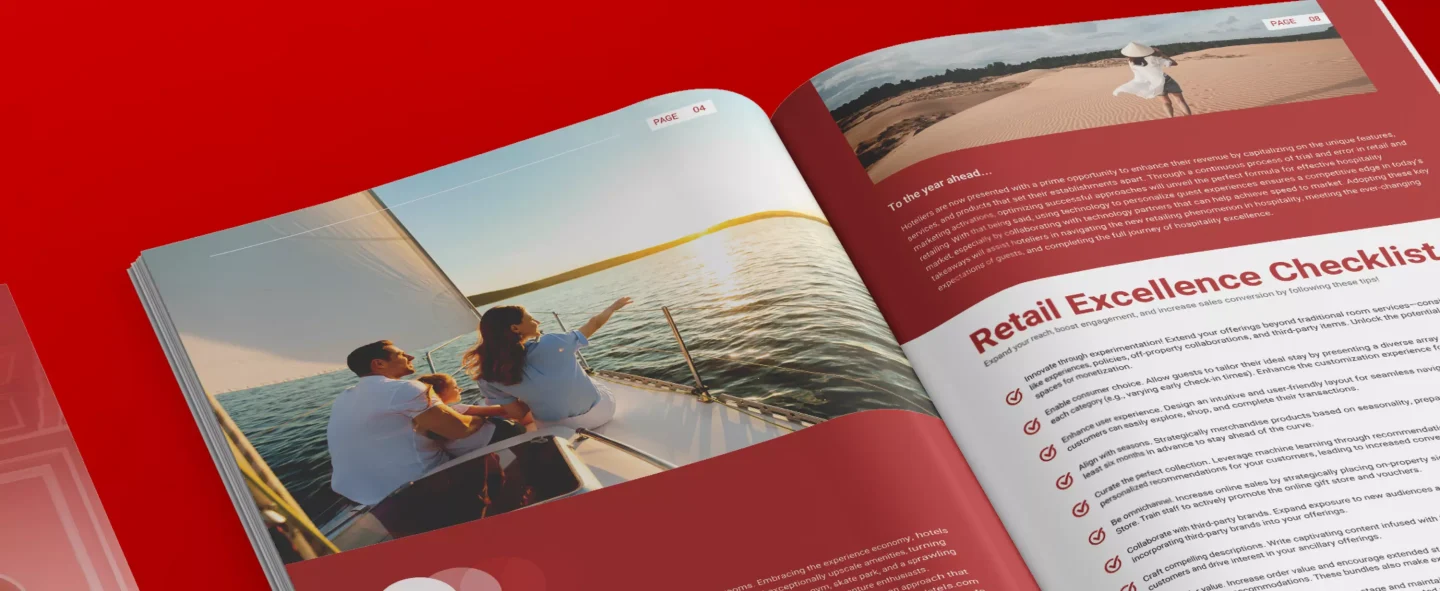Hospitality and hotel marketing insights and trends
Stay ahead of the competition with expert marketing strategies tailored for hotels. These strategies are designed to maximize direct bookings, increase visibility, and foster guest loyalty. Dive deep into this comprehensive guide to embark on your hotel’s revenue growth journey today!
What is Hotel Marketing?
Hotel marketing involves connecting with potential guests to persuade them that your hotel is their ideal choice for their next trip or to entice them to take advantage of the hotel’s ancillary offerings beyond just a room. In today’s digital age, much of a hotel’s marketing efforts are focused online to engage potential guests as they navigate their digital activities. Effective hotel marketing aims to increase bookings, build brand awareness, and foster guest loyalty.
Why is Hotel Marketing important?
Competing hotels and online travel agencies (OTAs) invest significant effort and money into promoting themselves to potential guests online. For guests, researching and planning their next trip is a crucial part of determining their plans and itineraries. This process provides hotels with numerous opportunities to capture potential guests’ attention.
However, these same opportunities are also available to competitors. To succeed in this competitive landscape, your hotel marketing efforts must be both smart and strategic. By effectively positioning your hotel and leveraging the right marketing strategies for your hotel and its market, you can stand out from the competition and attract more guests.
Key takeaways:
- Maximize direct bookings for higher profitability and control
- Engage guests on social media to build trust and visibility
- Use paid search ads for visibility and revenue
- Compete with OTAs on metasearch platforms
- Deploy AI-driven ads with Performance Max for travel goals (PMTG)
- Increase visibility with Google Property Promotion ads
Hotel marketing insights
To maximize your hotel marketing efforts online, it’s crucial to understand where your guests are in their journey. For example, are they just beginning to consider a trip? Are they researching specific destinations and accommodations? Or are they ready to book and have completed their research?
Identifying these stages allows you to tailor your marketing strategies accordingly. While a large budget may allow you to be everywhere and reach everyone, a strategic approach can yield significant returns even with limited resources.
Good marketing means nothing if it’s in front of the wrong person. By targeting your hotel’s market and key touchpoints in the guest journey, you can allocate your marketing budget more effectively to achieve the best results.
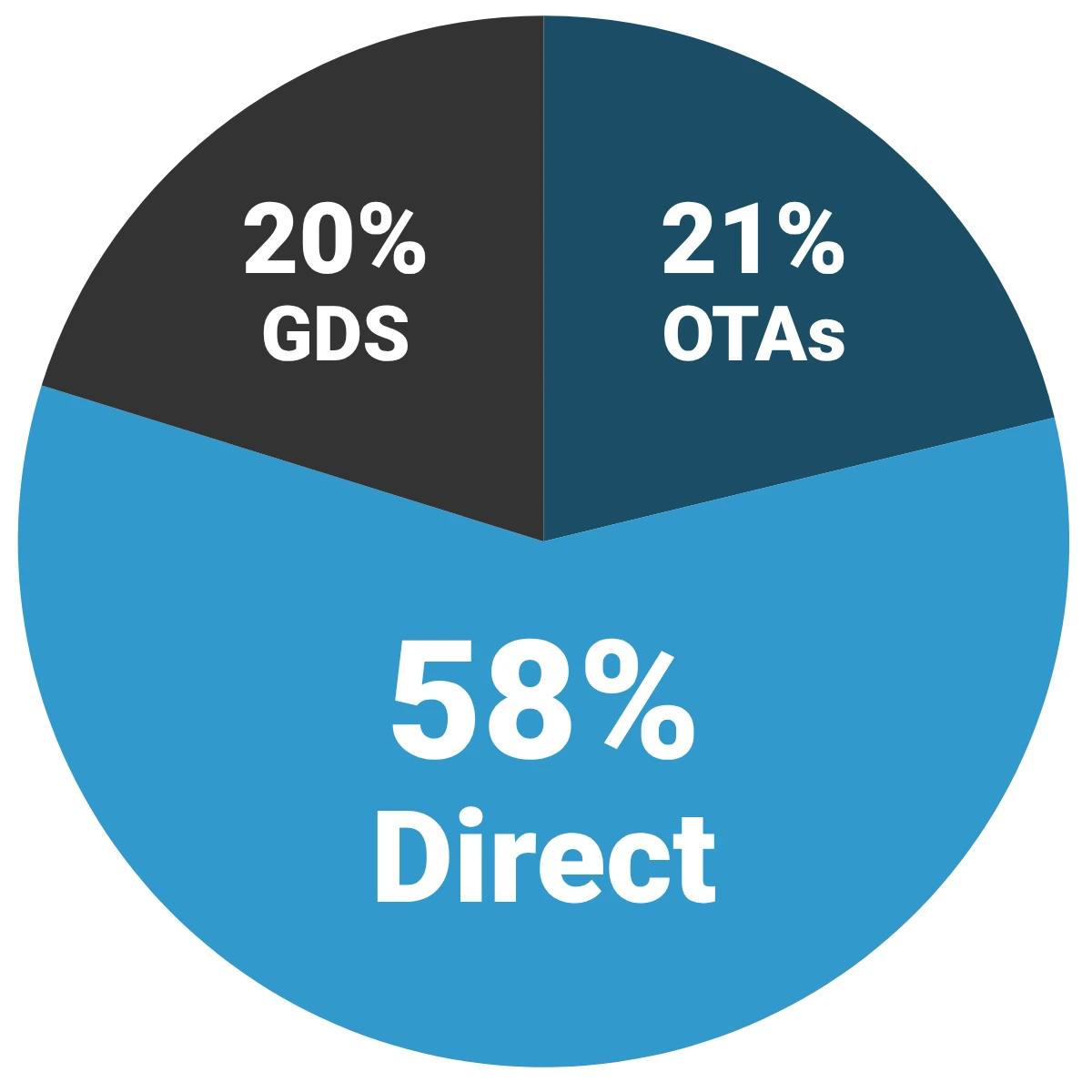
– HEDNA, 2025
The largest number of bookings for the average U.S. hotel comes from Direct
GDS and OTAs are nearly tied for the number of bookings
Maximizing direct bookings
Every hotel loves direct bookings because these guests are more than just customers; they’re an opportunity to build a lasting relationship. Direct bookings allow you to own the marketing data and provide a more personalized experience, increasing the likelihood of repeat visits. While booking through online travel agencies contributes to revenue volume, these bookings come with high commission rates (usually 15-20%), high cancellation rates, and guests who often seek the lowest possible price.
Effective digital hotel marketing can drive direct bookings and keep your cost-of-sale (the amount spent to secure a booking) low. With OTAs, you’ll be paying commissions, but by converting OTA bookings to direct ones, you’ll save money that would otherwise go to them. This strategic approach enhances your profitability and strengthens your direct relationship with guests.
Attracting business directly to your hotel’s booking engine improves margins and allows you to manage the full guest experience. With many digital media options, it can be hard to figure out which to focus on for your brand. Google makes it accessible to find what you need to start growing direct bookings through their hotel owner’s starter guide.
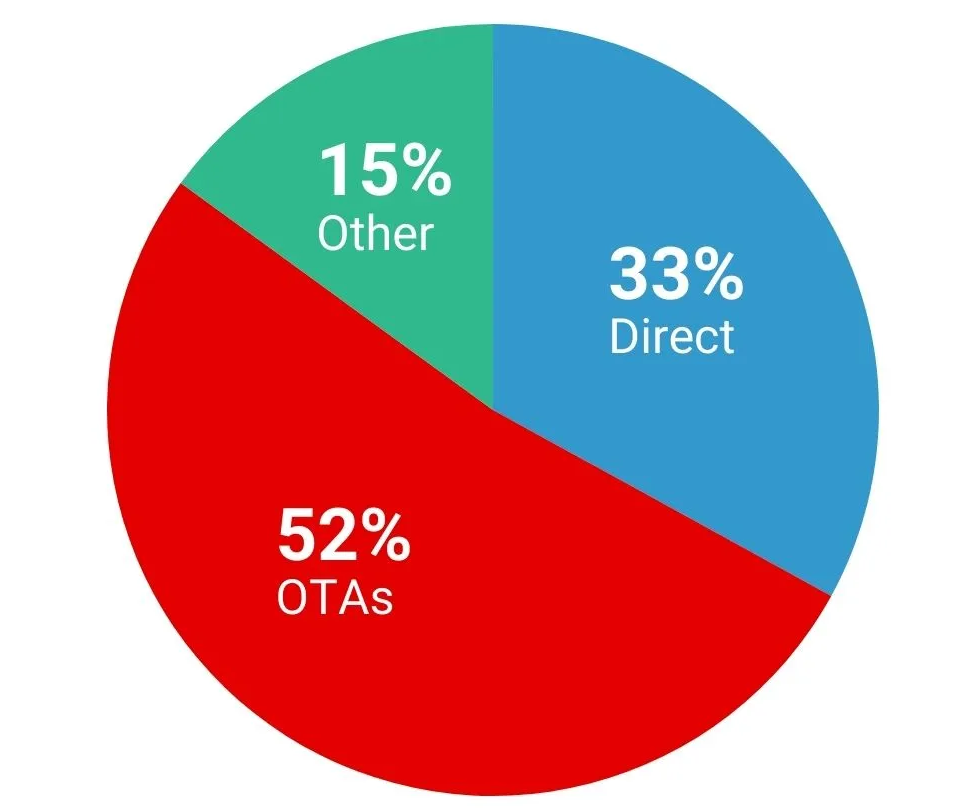
The largest number of bookings for the average U.S. hotel comes from OTAs (52%)
The second largest coming direct through the hotels’ booking engine (33%)
Social media strategies for hotels
Creating posts and content for your existing social media audience is essential to stay active and relevant with past guests who already enjoy your hotel. The goal is to remain top-of-mind and encourage repeat visits in the future. At the same time, you can use these platforms to attract new potential guests. Social media channels bring in a similar audience to other online spaces, but users here are more likely to interact with content by liking posts, commenting, or sharing with friends and family.
Social media hotel marketing also provides an excellent opportunity for potential guests to browse through your property, offering a virtual peek into what makes your hotel and its experience special. This engagement can significantly enhance your hotel’s visibility and appeal!
Fundamentals for hotel social media marketing
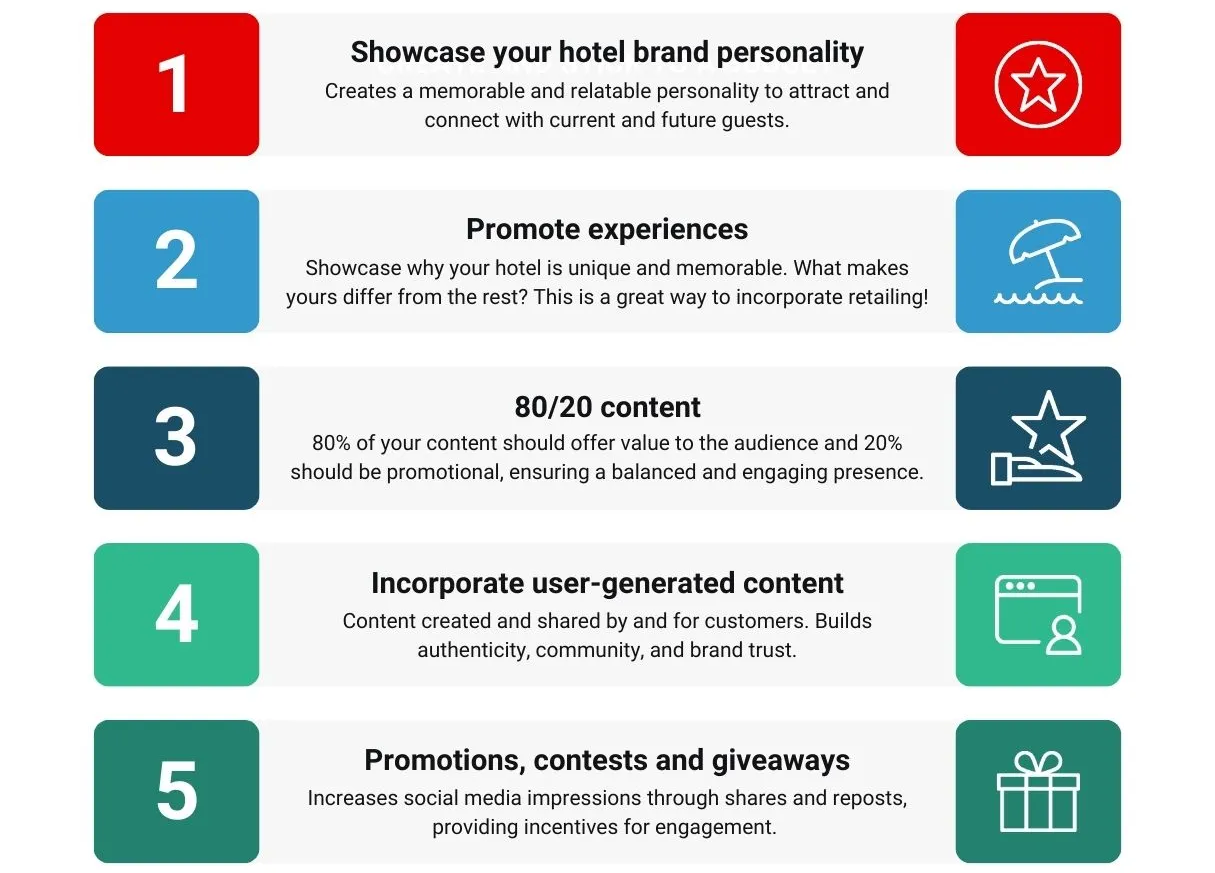
Paid search strategies for hotels
Paid search involves purchasing ads based on keywords to ensure your hotel appears at the top or within search results on Google, Bing, Yahoo, and other search engines. This means that even if someone searches for your hotel name verbatim, a competitor or OTA can buy that ad space and push your organic search result down, often capturing the click instead of you. It’s crucial to ensure potential guests find you first, preventing them from being redirected to someone else’s business.
Additionally, you can purchase keywords relevant to your hotel’s unique features, such as “rooftop pool,” to attract users interested in specific amenities and compete effectively against other hotels offering similar experiences. Bidding on non-brand-specific searches expands your hotel’s reach and increases awareness. It helps you connect with prospects in a way that brand search doesn’t.
5 advantages of paid search
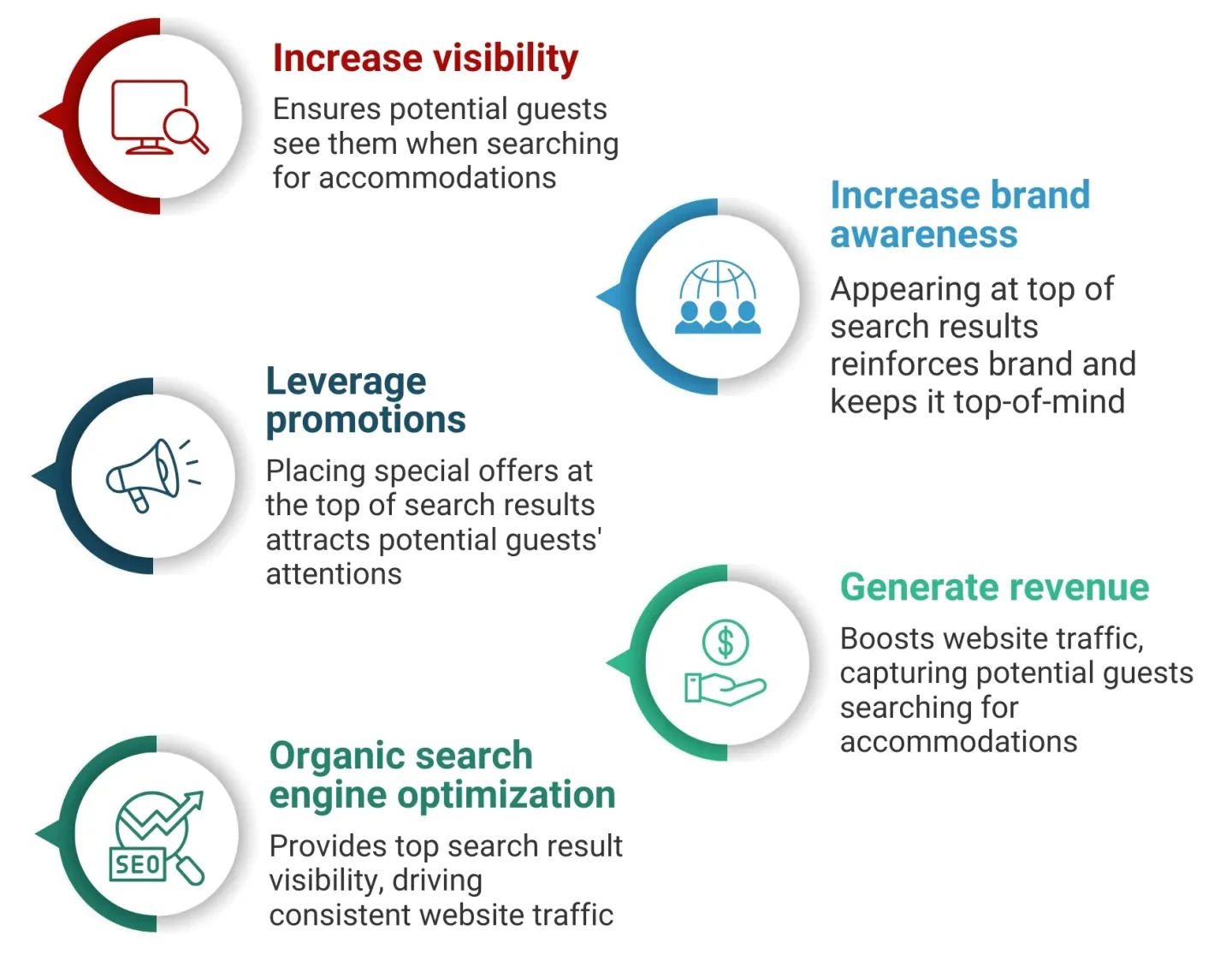
booked room revenue generated by Hospitality Solutions in 2023
of clicks on Metasearch are on the first 4 spots
of users choose to go direct when faced with the same price on OTA and brand
of hotel’s digital budget is allotted for Metasearch today
average cost-of-sale
Metasearch strategies for hotels
Metasearch refers to online areas where an individual hotel’s prices are aggregated, giving users various booking options:
The most common of these platforms include Google Hotel Ads (displayed under a hotel’s Google My Business listing), Tripadvisor Check Rates, Kayak, and Trivago. Google dominates this space, allowing hotels to compete directly against OTAs for bookings. Users in this space are often well into their planning process and are ready to book their stays. When executed correctly, metasearch is an effective digital marketing tactic to capture bookings with last-click attribution, keeping costs low and maximizing return on investment.
Harnessing the full potential of metasearch requires a partner like Hospitality Solutions. Hospitality Solutions provides the necessary tools and expertise to optime metasearch campaigns, ensuring hotels can maximize direct bookings, enhance visibility, and compete effectively against OTAs.
Ready to leverage metasearch to boost your hotel bookings and stay ahead of the competition?
Google Property Promotion strategies for hotels:
Google Property Promotion ads appear in the user interface (UI) that online users encounter when searching for hotels in a specific area. Within this interface, users can explore various hotels based on criteria such as location, amenities, and price, often scrolling through a map to find their ideal stay. Google Property Promotion ads boost your hotel’s profile to the top of the competitive list and on Google Maps, increasing the likelihood that potential guests will view and research your hotel over others.
Why Google Property Promotion works:
- By linking ads directly to your booking engine, guests can book directly from the ad and not through an OTA, reducing reliance on OTAs and saving on commission fees
- It can be customized based on user behavior, location, and search intent, meaning your ads reach the right people at the right time
How Google Property Promotion works:
- Google Hotel Ads show real-time room availability and rates
- Google My Business optimizes your profile with up-to-date info, photos uploaded by you, and regular posts like positive reviews and ratings
- Google Ads uses search ads to target specific keywords
- Google Local Services Ads promote
sadditional services your hotel offers to local users searching for those services - Tools like Google Analytics and Google Travel Insights help you understand user behavior and market trends, helping you streamline strategies and target more effectively
The success of this strategy can vary depending on the hotel and market, so it’s advisable to test its effectiveness before committing to it long-term as part of your digital marketing efforts.
Google Property Promotion strategies for hotels:

Performance Max for Travel Goals (PMTG) strategies for hotels:
Performance Max for travel goals is a Google program that uses AI to deploy ads across various Google environments. These ads can appear as display ads, paid search ads, YouTube ads, metasearch ads, and Property Promotion ads, depending on where Google identifies potential guests in their trip planning phase. PMTG helps you connect with future guests by showing your ads across the full range of Google advertising channels with a single setup. Need help creating your first campaign?
This program is best utilized as an additional layer to your core digital marketing tactics, helping to uncover potentially hidden guest bookings and achieving a desirable return on investment. By leveraging PMTG, hotels can enhance their visibility and engagement across multiple platforms, ensuring they reach the right audience at the right time.
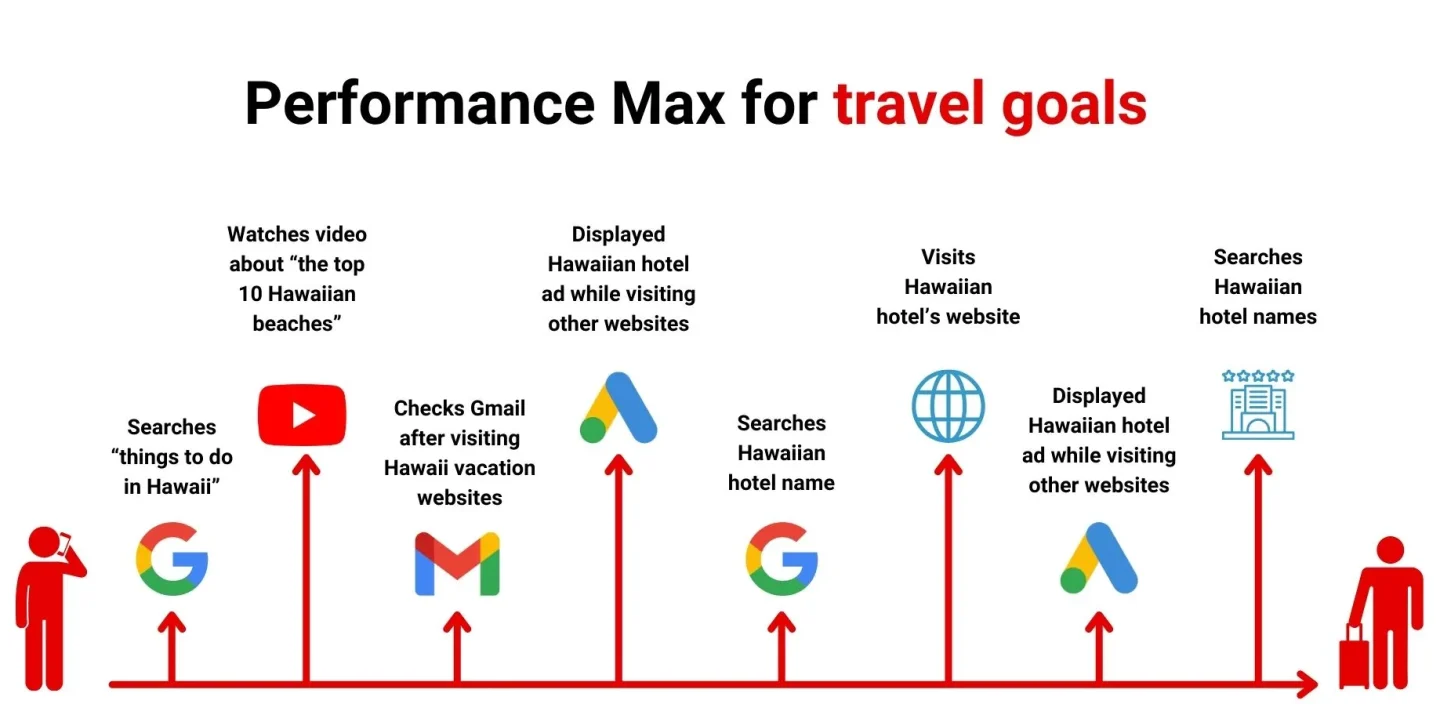
Current industry trends
Staying updated with the latest hotel marketing trends is crucial for maintaining a competitive edge in the hospitality industry. As technology evolves and consumer behaviors shift, hotels must adapt their marketing strategies to meet the changing expectations of travelers. By staying current with industry trends, hotels can implement innovative tactics, enhance guest experiences, and drive more bookings. Whether leveraging AI for personalized marketing, utilizing social media to engage with guests, or optimizing mobile experiences, keeping pace with these trends allows hotels to remain relevant and appealing in a crowded marketplace.
Going above and beyond room revenue alone
Why this approach is highly effective:
- Hotels can understand individual preferences, allowing them to offer personalized recommendations for amenities, activities, and more
- Guests can be presented with tailored options that match their interests, like spa treatments for past spa visitors or dining opportunities for “foodies”
- Hotels can increase revenue by suggesting promotions, such as a guest booking a room being offered an upgrade for an additional fee
Online analytics is not just about driving direct bookings, but about driving quality direct bookings. Expanding offerings beyond rooms to include goods, services, and experiences (both on- and off-site) can create additional revenue streams. This process is called hospitality retailing, which not only diversifies revenue streams but also enhances the guest experience by providing more personalized and convenient options.
Hotel retailing is a marketing strategy that focuses on offering a variety of products and services to hotel guests in a personalized manner. This approach is highly effective in targeting customers better through product offer personalization.
What if you could sell to your guests at every step of the journey?

Shop
“I want to see family-friendly places to stay”

Book
“I want to arrange an early check-in and champagne in the room”

Pre-stay
“I need to book a massage and activities for the kids”

In-stay
“I want to book a cooking class”

Post-stay
“I want to give my Mom the same experience for her birthday”
Personalization throughout the guest journey creates unique and seamless experiences
Incorporating retailing into your marketing strategy involves using data-driven insights to identify high-margin products and target potential buyers through personalized digital campaigns.
For example, if your digital marketing data shows guests purchase premium amenities like luxury bathrobes, you can create targeted marketing campaigns aimed at guests with similar preferences. By doing so, you could increase ancillary revenue, perhaps doubling the number of robe buyers from 10% to 20% among your monthly bookings.
Questions and answers
A conversation with Sarah Hoffman, Principal Product Manager at Hospitality Solutions
How has the landscape of hotel marketing evolved in recent years, particularly with the rise of digital channels?
- In the past year or two, the most significant change has been the integration of AI. We’ve been using the newest channel, Performance Max for travel goals, which has essentially consolidated all existing channels into one. This integration is the future of advertising for hotels as it puts everything together seamlessly.
In what ways has Hospitality Solutions changed its marketing strategies for hotels to meet those changes with AI and PMTG?
- Previously, hotels would come to us with extensive budgets across multiple platforms. Now, we present PMTG to clients as their one-stop shop. They can provide us with any budget amount, which grants them visibility across seven different channels. PMTG offers substantial visibility with a single monthly budget.
What are some strategies that Hospitality Solutions has implemented to increase direct bookings?
- We follow Google’s recommendations closely because success in our landscape requires adherence to Google’s guidelines. When Google introduces a new tool or feature, we implement it to enhance our campaigns. Campaigns that align with Google’s rules tend to achieve better results.
What are the key benefits of using paid search and Meta search for hotels?
- The primary benefit is driving bookings directly to the hotel’s website. Compared to the costs associated with OTAs, direct bookings can often be achieved at a lower cost. Additionally, by reaching guests directly on your website, you can offer incentives like free breakfast for bookings made on your site. Importantly, you can add these guests to your marketing list, allowing for future remarketing opportunities. In contrast, OTAs retain all guest information, preventing you from building a direct relationship with the customer.
How has consumer behavior in the hospitality industry shifted in recent years?
- Consumer behavior has increasingly shifted towards video content. Many potential guests are now using various media before making a booking decision. YouTube, the second-largest search engine, has seen a significant increase in use, particularly with the rise of YouTube Shorts, which is trying to capitalize on TikTok’s popularity. PMTG is essential because it consolidates and automates marketing efforts. As people search across multiple platforms for bookings, we must ensure our presence on all platforms to capture their interest.
What do you see as the future of hotel marketing?
- PMTG is here and it is where a lot of our clients are shifting to. I think that PMTG and Demand Gen [another Google marketing product] will bundle, giving Google considerable control over marketing efforts. This consolidation means putting your marketing budget into one channel and trusting Google to display your hotel where it deems most beneficial.
Next Steps
Audit your current marketing efforts
Evaluate your existing digital marketing strategies to identify strengths and areas for improvement
Identify your target market
Conduct research to understand who your ideal guests are. This will help tailor your marketing strategies to effectively reach and engage with your target audience
Implement GA4 Analytics
Set up Google Analytics 4 to take advantage of the new features and gain better insights into your marketing performance
Leverage social media
Create engaging content tailored to your existing and potential guests. Use social media platforms to showcase your hotel’s unique features and interact with your audience
Utilize paid search ads
Invest in paid search ads with relevant keywords to ensure your hotel appears prominently in search engine results
Consult with experts
- Consider seeking expertise from marketing professionals to refine your strategies and implement best practices tailored to your hotel’s unique needs
- Hospitality Solutions offers custom hotel digital marketing under our Acquisition Studio, providing solutions for hoteliers to grow their marketing across distribution channels
- Request a demo from Hospitality Solutions Hospitality today! Learn how we enable hoteliers to increase direct sales, boost customer satisfaction, generate more revenue per room, and more


